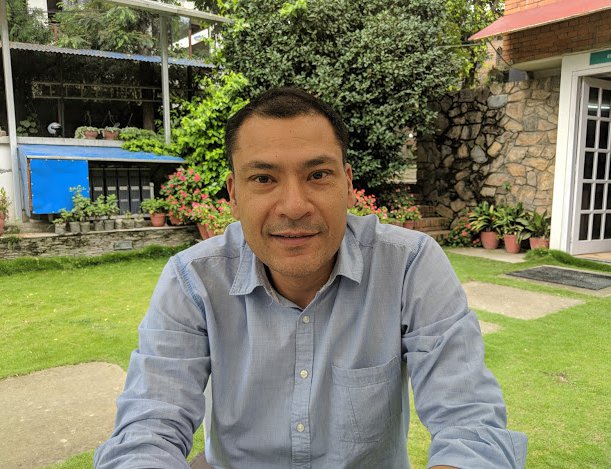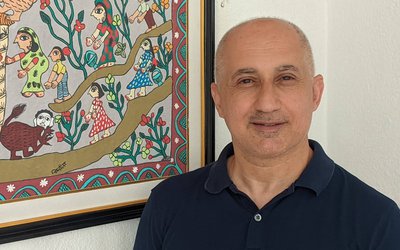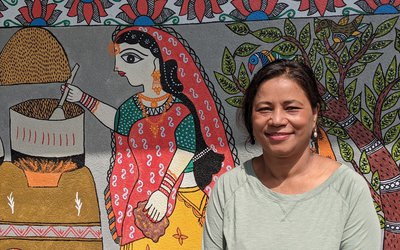
What are the areas in which Practical Action Regional Office is working in Nepal?
We are basically working now on four sectors, disaster risk reduction (DRR) and climate change, agriculture and market, access to energy and water, sanitation and hygiene (WASH). However, in WASH sector we are working on fiscal sludge management. We have just concluded a project and we don’t have any new project. We have completed a project launched in joint collaboration with Gularia Municipality. We have built a plant for fecal sludge management and it is now owned and operated by Municipality.
INGOs and NGOS are widely criticized for their selection of the project and priority. How do you look at this?
Only ignorant people can think that way. INGOs are involved in projects by completing a series of processes before commencing them. INGOs and NGOs implement the projects only through the consent of local level, community and approval of the Social Welfare Council and concerned ministries. There is a law; guidelines and system which all INGOs need to follow for project approval. There is involvement of all the stake holders from beginning to end. INGOs and NGOs have nothing to do with project selection. It is the local level and community which demand the project and INGOs implement it with approval of government. The process is tedious.
How does Practical Action work then?
Since we have identified four sectors, Practical Action goes for the fund in these sectors. We do conduct a need assessment and plan where we need to focus for three years. We analyze all the details. With the consent of community, local level and government, we decide the project. After all, we need to submit our proposal for donors for funding.
INGOs and NGOs are alleged to be working as a parallel government?
One needs to be clear that INGOs and NGOs are not of the government. They cannot solve all the problems. We can support in the areas of certain strategic importance of the government. We have been complementing the work of the government. Practical Action is bringing changes in its approach. We are diverting from holistic and larger projects.
What kinds of projects is Practical Action going to implement?
We believe that projects should not be big but what is required is what impression and impact it will leave in the community. We have to find where the constraints are in the system. Our aim is to unlock the constraint. We design the project to unlock the constraint. If a small project unlocks constraint, it will have bigger impacts. Our new thinking is to implement the projects which can unlock the constraint. For example, we are implementing projects to commercialize agriculture. We look at constraints which are blocking the commercialization of agriculture. Practical Action intervenes in the areas where there are constraints.
What is the normal period of the project?
We set ambitions for three years. We develop projects. We collect the information, discuss the matter with local community, elected leaders of local level and government officers. After discussing intensively with all the stakeholders, we develop the proposal and talk about the approach with donors.
How does Practical Action work?
We do have reactive and proactive approaches. In some cases, we follow the reactive approach and in others proactive. We pursue the donors about the projects. The projects will be finalized only after intense discussions. Once the donors agree to fund the project, then only we talk with donors regarding the compliance.
What is the problem right now?
The problem right now is that the government is demanding commitment from us even before the donor’s consent. INGOs do not have money for themselves. They have to depend on the donors. In many cases, it will be difficult for INGOs to go for full compliance. First, we consult with the community, local elected body and concerned government offices. After the consultations and consent of these three tires we are set for implementing the projects.
There are accusations that NGOs and INGOs are running the projects on their own? What do you say?
Projects cannot be made as per the wishes of INGOs or NGOs. We have to pass through several scrutiny before implementing projects. It is true that we are unable to convey this long and tedious process to the people. Again, I want to repeat that INGOs are not a parallel government and they are here to support priority areas of government.
Do you have your own rule to implement the project?
Actually, we follow laws, rules and government policies. We are registered with Social Welfare Council and projects are implemented under partnerships with ministries, local elected bodies and community. We develop the plan with consent of people and their need. We do consultations at different level as required. We do hold consultations with departments and ministries. I cannot claim that all INGOs pass the procedure like us. So far as Practical Action is concerned it closely works with the government. Our aim is to complement the government in four areas.
What kind of program are you implementing?
We have been focusing on innovative approach and new sector. We do also launch program in piloting and demonstration. After piloting and demonstration, we launch the program taking the learning experiences of the project.
Do you hold the consultations?
As I have mentioned, we hold the consultation on different level and different tire. Honestly saying that it is coming in public. All the INGOs have same approach and model. Without consultations, one cannot develop the project. We are unable to publicize it and it is not in the knowledge of all.
As you said you develop under the consultation with government, however the government officials see you are not complementing them but working as competitor. What do you say?
There is a problem to put all NGOs and INGOs in the same basket. I cannot say that all INGOs and NGOs have been perfect. However, one needs to distinguish the INGOs which are genuinely working for the community and people with the government, helping government and supplementing the government. There are lengthy processes before signing the project agreement. Without fulfilling all the processes, one cannot sign the project agreement. There is a well planned coordination mechanism, and one has to go through it. A consent letter from local level is a must to sign the project agreement with the Social Welfare Council. The permission is given only after the approval of local level. It is true that is not coming in public.
The process is itself lengthy. People, however, think that INGOs and NGOs implement projects overnight. Why don’t you disseminate the lengthy process?
The process is lengthy. We have to comply with all the rules and regulations of the government. We are unable to disseminate this to public.
How successful are the projects implemented by INGOs?
We have implemented a number of programs and projects which are replicated by the government and community. We do launch small scale projects and test innovation and approach to scale up. In the agriculture sector, we are launching the program as to how we should improve the extension service. We are implementing the projects in Kalikot, Achham and Bajura.
How is your program is different from that of the government?
Government too has extensive service but they don’t have enough manpower. We complement them. Our program barefoot agro-vet concept is widely popular. Barefoot Vet works with district level agro vet. Bare foot agro vets are generally areas leader farmers who have contact with household level. Leader farmers support the local farmers. They also collect information. We are introducing new business model at community level and this is also replicated to community.
What about the access to energy?
In the past, we worked a lot on micro-hydro in access to energy. Now we are focusing on sustainable energy program our experience is that most of the micro hydro is now operating to generate electricity to light. There are wastes of day time energy. We are focusing on how to use the waste energy for productive use. We are working with micro-hydro and supporting to build enterprises. We are doing this on the basis of need of the community. Waste energy can be used for entrepreneurs to generate the money. We are also working for example in energy’s nexus to agriculture. Irrigation is the main problem in the agriculture sector. We are planning to support water lifting we are demonstrating now. Even we are working for solar water lifting in different stages. We are lifting the water through different series. We are developing the business an enterprise model. Gradually, many projects are replicated.
INGOs are also blamed as working in short term projects. You have been supporting early warning system in Nepal. What is the state of the project now?
We supported Department of Hydrology and Meteorology to develop the early warning system in different regions. Hydro-met hazard is one of our areas. Thus we will continue to work in early warning systems. But the approach will be different now. We worked with Department and now the project is owned by DOHM and other INGOs and NGOs are replicating it. Now we are working to improve the early warning system.
How do you evolve the system?
We evolved the system stage by stage. Initially, we built tower and used siren to aware the community. Now we have all automated system. Now we are working on forecast based system. We work for real time. Watch and warn, now real time. We analyze the data with gauge read with DOHM. We renovated the gauge. We have now several systems to see the level of rivers. DOHM website gives information. We are now focusing on forecast base system. We are covering the entire weather forecasting for a week. We are advancing the system.
- TANAHU HYDROPOWER PROEJCT: A Significant Achievement
- Apr 15, 2024
- AMBASSADOR HANAN GODAR: Sharing Pain With A Nepali Family
- Mar 30, 2024
- VISIT OF KfW AND EIB TO NEPAL : Mission Matters
- Mar 25, 2024
- NEPAL BRITAIN SOCIETY: Pratima Pande's Leadership
- Mar 24, 2024
- NEPAL ARMY DAY: Time To Recall Glory
- Mar 15, 2024
















